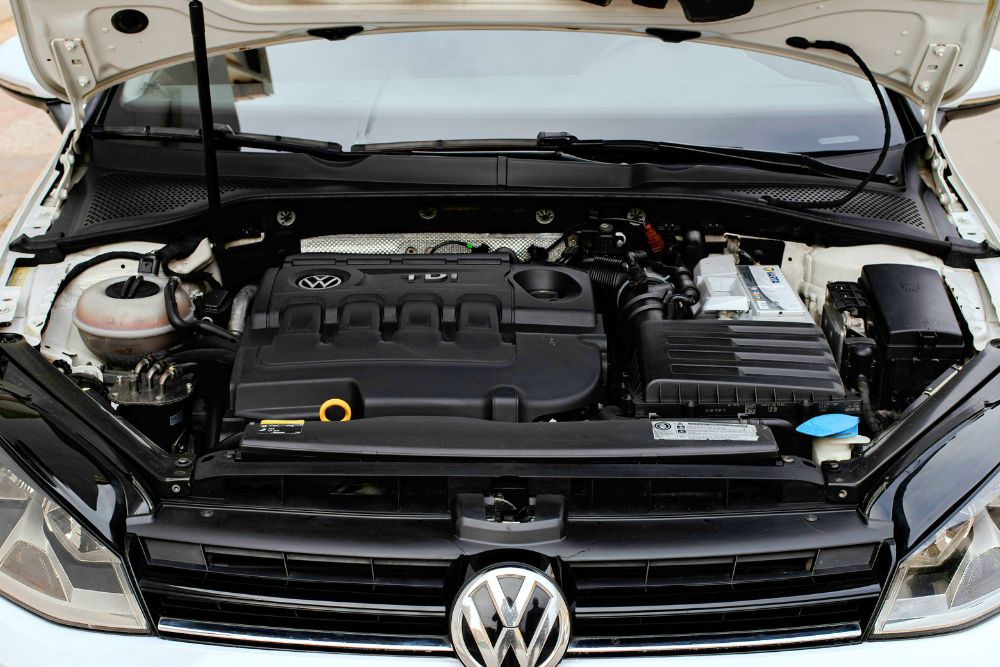
Volkswagen Golfs are known as very reliable cars and can last a very long time. Golf engines usually last from 150,000 to 200,000 kilometres without major issues, as long as the engine has been regularly maintained. This means changing the oil regularly, using high-quality fuel, and monitoring key parts such as the timing belt and sensors.
There are a number of important factors that can dictate the lifespan of an engine. In this blog post, we will cover what they are, and what you can do to increase the life of your Golf’s engine.
Factors Affecting Volkswagen Golf Engine Lifespan
There are a number of factors that can greatly affect the lifespan of your car’s engine. It’s not merely about routine oil changes and maintenance.
The way you drive holds a crucial role. Regular short journeys and hard driving can negatively affect your engine, shortening its lifespan.
The standard of petrol you use is also important. Superior-quality petrol can enhance engine performance and lifespan, so it’s worth thinking about using premium petrol for your Golf.
Correct upkeep of other parts is vital as well. For instance, the timing belt, sensors, waterpump, coolant and other maintenance items need to be maintained. If these components fail, they can result in poor running or even serious damage to your engine.
The Importance of Regular Maintenance For Engine Longevity
Looking after your Volkswagen Golf is crucial for its long-lasting use. Sticking to the suggested upkeep timetable isn’t just about keeping it from wearing out, it’s about making sure it performs at its best.
Keep in mind, routine maintenance can also detect possible problems early, saving you from expensive repairs later on and potential fatal damage that can engine the life of your engine.
Scheduled Servicing Essentials
Regular upkeep of your car, including timely oil changes, filter swaps, and fluid checks are crucial for your engine’s long life. Don’t overlook the importance of these routine checks. They’re key to your engine’s durability and can help you steer clear of sudden breakdowns.
Sticking to the suggested service timetable from the manufacturer is a smart move. It’s a preventive step that aids in ensuring the best engine performance and stops early wear. Irregular servicing or missing scheduled upkeep can result in engine problems and less fuel efficiency.
Don’t forget to add tasks like changing spark plugs, checking belts, and swapping air filters to your maintenance routine. These seemingly small checks make a big difference to your engine’s lifespan.
Preventive Maintenance Benefits
Adopting regular upkeep measures like timely oil changes, fluid checks, and tune-ups can greatly extend the life of your car’s engine. Frequent checks aren’t just for keeping your car in good shape—they offer vital safeguarding for your engine, helping to stop unnecessary wear and tear, and making sure it performs at its best.
Here are three main benefits of regular upkeep:
- Spotting Problems Early: Regular upkeep can help find potential problems before they get worse. Spotting and fixing small issues early can stop more serious damage and expensive repairs later on.
- Improves Fuel Efficiency: A well-kept engine runs more efficiently, which can better your car’s fuel economy. This not only saves you money on petrol but also lessens the environmental impact.
- Lengthens Engine Life: By sticking to the manufacturer’s suggested upkeep schedule, you’re giving your engine the best chance of reaching high mileages. In fact, well-kept engines can often reach 200,000 km or more.
Don’t ignore your car’s upkeep—it’s the best way to ensure that your car’s engine lasts as long as possible.
Impact of Driving Habits on Engine Life
Your driving habits can greatly affect how long your car’s engine lasts. For example, often taking short, brisk drives of less than five kilometres can put stress on the engine and gearbox. This stress might harm your car’s lifespan. Hence, it’s better to choose longer, smoother drives when you can.
Likewise, daily travels in start-and-stop traffic can add to wear and tear on your car’s engine, lowering its overall life span. Thus, dodging peak hour traffic could help prolong your engine’s life.
Gently breaking in a new car for the first 1,000 kilometres can also help keep the engine healthy and lasting longer. This is a good habit to adopt if you’ve recently bought a new car.
Role of Fuel Quality in Engine Life
Just as the way you drive can make your engine last longer or shorter, the type of fuel you use also matters a lot. You may not realise this, but the fuel you put into your car can make a difference to how long its engine lasts.
Poor quality fuel can harm your engine performance, leading to buildup of carbon and potential long-term harm. This buildup makes your engine less efficient, meaning it has to work harder and may not last as long. The is particularly a problem with direct injection engines used in the Golf 6 and newer models.
On the other hand, using good quality fuel with the correct octane level can help ensure the best combustion, which reduces the chance of engine problems.
Here’s why fuel quality is important:
- Carbon Buildup: Bad quality fuel leads to carbon deposits which can harm your engine’s performance over time.
- Engine Knocking: Poor quality fuel can raise the risk of engine knocking (pinking), which may lead to early wear and tear.
- Engine Longevity: Regular use of top-tier fuel not only improves engine efficiency but also helps it last longer.
Volkswagen Golf’s Performance Over 200k Kilometres
You may be curious about how you Golf will performs after it has travelled over 200,000 kilometres. Impressively, many reports suggest that these engines are still performing well at this point.
Let’s talk about how engine robustness and routine upkeep contribute to this long life.
Engine Durability Post-200k
With good care and upkeep, your Volkswagen’s engine can keep going strongly, even past the impressive 200,000-km point. Many drivers have told of their engines working well and effectively, which shows how sturdy and dependable these machines can be.
You may be asking, what makes this long life possible? Several things are important:
- Regular oil changes: Fresh oil boosts your engine’s performance, lessens wear, and makes it last longer.
- Good fuel: Using good fuel makes sure the burning process works efficiently and lessens damage to your engine parts.
- Driving habits: Smooth, steady driving puts less strain on your engine, thus making it last longer.
Besides, correct upkeep of engine parts like timing belts, sensors, and plugs can extend the engine’s life well past the 200,000-km point.
Conclusion
So, how long will an average Volkswagen Golf engine last? Generally, with regular care and upkeep, it can easily reach over 200,000 kilometres.
If you need someone trustworthy to perform a VW service in Auckland, be sure to speak to us today by calling 09 441 3635 or emailing service@dodsonmotorsport.com.

 Looking for Dual Clutch transmission components outside of New Zealand?
Looking for Dual Clutch transmission components outside of New Zealand?